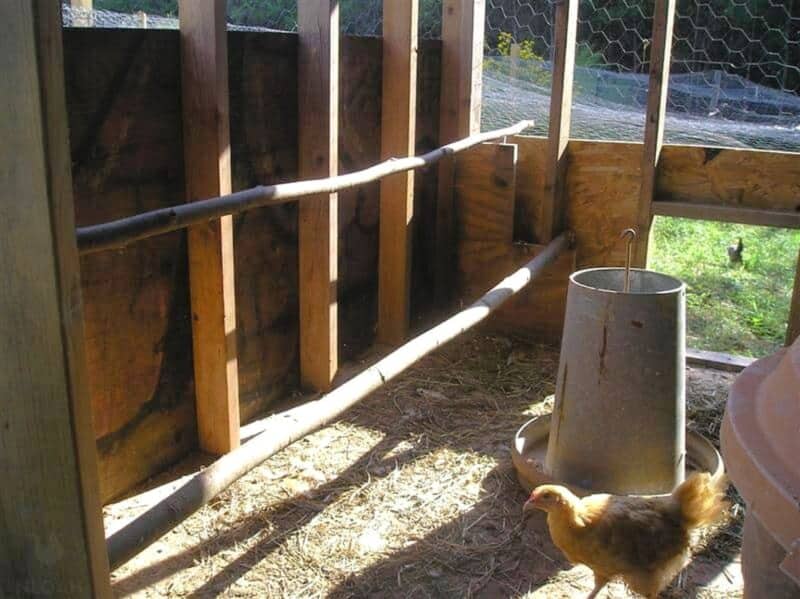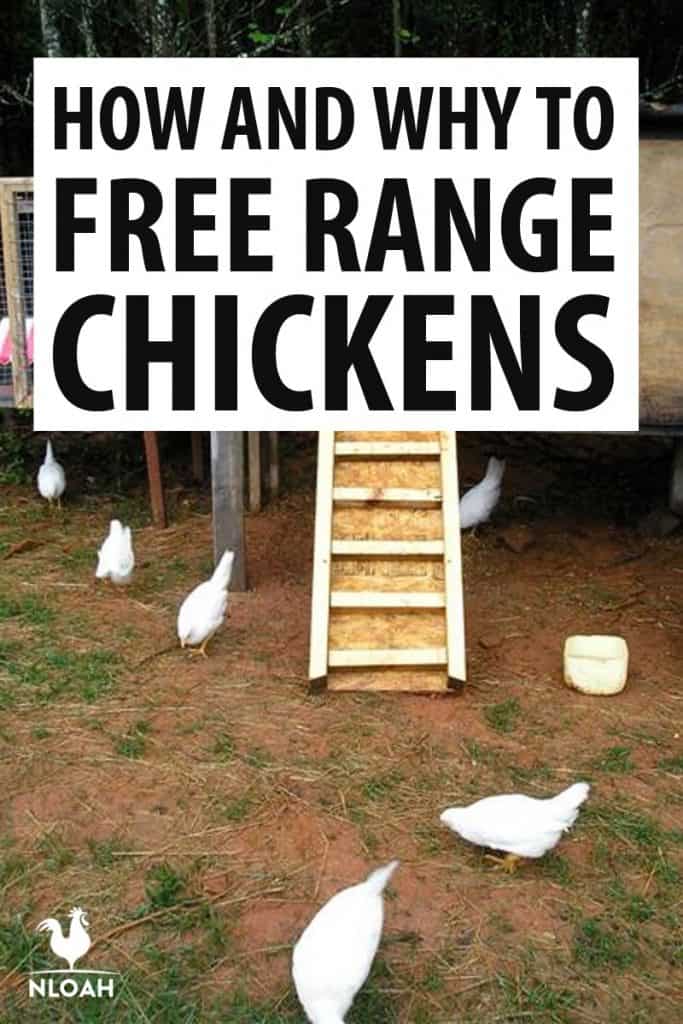Well, we finally did it. Our chickens are officially free! I’ve been dying to let them loose, but was sooo afraid that I’d never get them back again, especially after that last enthralling chase!
My husband found a few extra minutes the other afternoon, and was able to quickly put together a nice little ladder for the chickens.
Once he got it made and took it down to the chicken coop, we just stood there together for a minute looking at it. Jerry looked at me and finally asked, “Well, should we let them out?” We both looked at the chickens doubtfully.
I shrugged and said, “Supposedly they’ll go back in when it gets dark.” We hesitated another minute as we contemplated the possibility of losing all of our chickens.
Finally I said, “Let’s let them out.” So, we opened the door and waited to see what would happen. At first the chickens just stood there looking at us, but finally they decided that they would step out and explore their new opportunity.
Once their little feet hit the dirt below they were noticeably pleased! Off they wandered into the woods directly behind their coop, scratching and pecking away at the ground.
We watched them for a minute, smiling at their happiness, then went about business as usual again.
The silly goats (who are always lose now during the day) thought they’d take advantage of the new ladder as well, and when nobody was looking, quickly scurried up into the chicken coop to gobble up the chicken feed inside. Rascals.
Well, nightfall soon came and my husband went out to check on the chickens. We crossed our fingers that they would indeed be inside the coop again. I waited inside, anxious to hear the results. A few minutes later he came back in and announced, “They were all in there!”
“Yay!” I shouted at the good news. I was so glad they went back in. All he had to do was shut the door for the night. How easy was that?!
So now we’ve been letting them out every day, all day, and at night they just go back home on their own. I am so happy for them to finally be doing what they love, roaming free enjoying the land.
We had such a great experience letting our chickens free range that I wanted to let you know why – and how – you can do it, too.
Benefits of Free Ranging Chickens
There are plenty of excellent reasons to free range your chickens.
The biggest benefit? They’ll eat a lot less feed!
Chickens that free-range will spend the majority of the day roaming around eating everything from bugs to grass and even small rodents and snakes.
They will come back to the coop in the evening – or perhaps to lay their eggs – but that’s it. That means you can get away with spending a lot less money on feed.
You’ll also be able to spend less money on grit. When chickens are able to free range and pick up small rocks, sand, pebbles, and other “gritty” items, they won’t need commercial grit in order to process their food.
Free range chickens also serve as excellent insect and pest control. As you have probably already noticed, chickens will eat just about any kind of bug.
They are particularly good at eating ticks, meaning you may be able to cut down on the population of these dangerous pests on your property once you start letting your chickens free range.
Chickens can control other pests, too, like mice and small snakes. Some breeds of chickens are better at this than others, but most chickens will be happy to perform free pest control in exchange for a warm, dry place to sleep at night!
Chickens will even help aerate your compost for you. They love scratching through the compost pile and will turn it repeatedly, looking for bugs and other tasty morsels. No more going out there to turn the pile with a pitchfork!
Free range chickens produce eggs that are better tasting and more nutritious. In fact, eggs from free range or pasture-raised chickens have higher levels of vitamin E, A, and omega-3. They also have less cholesterol!
Birds that are allowed to free range are just happier and healthier overall. They are less likely to fight with each other, which commonly happens when they become overcrowded in a tiny coop. Ever heard of the phrase “cooped up?” That’s how chickens feel after too much time in the pen.
Chickens who are allowed to free-range rarely become overweight. They get all the exercise they need roaming about the yard and they’re healthier because they’re less at risk of catching communicable diseases from other chickens in your flock.
You won’t need quite as much space in your chicken coop, either. You’ll just need a couple of feet of roosting space per bird along with a place to lay eggs.
Challenges of Free Ranging Chickens
There are some challenges associated with raising free range chickens, most of which are luckily pretty easy to overcome.
For starters, a free range chicken will be an easy target for just about any kind of predator. Although chickens are already at the top of the menu for species like raccoons, weasels, foxes, bears, coyotes, and opossums at night, letting your birds free range during the day will really open up the floodgates.
However, you can control these attacks by limiting where your birds are allowed to free range. For example, you might only allow your birds graze in sight of the house, or you might want to add a livestock guardian dog to the mix to keep your birds safe.
Another challenge of free ranging chickens has to do with their eggs. If you don’t start them off on the right foot – with nest boxes – you’re going to kick yourself later on.
Chickens need to have a designated spot to lay their eggs so that they don’t lay in other funky spots, like inside hay bales or in the woods. If you don’t build nest boxes and train them to the boxes early on, you’re going to be going on egg scavenger hunts more often than you’d like.
Chickens are also destructive little buggers. Although they do an excellent job of removing pests like ticks and ants from your property, they also do a good job of removing flowers, vegetables, herbs, and other plants that you have carefully cultivated.
Again, you will want to make sure your property is chicken-proof before you set these creatures loose.
Don’t forget about the scratching and pooping, either. Chickens like to create dust baths – it’s a natural part of being a chicken! – but they will happily tear up your landscaping in order to make themselves comfortable.
They’ll poop everywhere, too, including on your deck and in your front yard. While manure is a great fertilizer, it’s really not that pleasant to step in on your way out to get the morning newspaper.
Finally, it’s uncommon, but it can occasionally happen – your free range chickens may decide they like the lifestyle so much that they’re never going to come back. This is common if you don’t get your chickens acclimated to the coop once you first move your birds outside.
Getting Started or Transitioning Your Birds to Free Ranging
To get started with free ranging your chickens, you need to remember that you won’t be able to turn freshly-hatched chicks out on the lawn to fend for themselves.
Instead, you will need to get them started in a safe space indoors, ideally in a house or barn brooder where they are offered an 18% chick starter, clean water, artificial heat, and safety from potential predators.
Once your chicks are at least six to eight weeks old and fully feathered (this will depend largely on where you live and what your weather conditions look like), you can move your chickens outside. It may make sense to start them in a coop so that they get used to it and recognize the coop as home – which is a point I’ll touch upon again later in the article.
If you have other chickens that also free range and call the coop home, it might be challenging to mix your flock. You will want to keep your new arrivals locked in for a few days so that they begin to recognize the coop as home. You may have some bullying issues, too, as the “veterans” get used to the new guys.
That’s why it can be beneficial to have a separate “holding pen” where you can house your new chickens separately before introducing them to your old flock. Once they are large enough to defend themselves – both against other chickens and various predators.
Over time, you will be able to integrate your old flock with your new flock and allow them to free range together.

Make sure your coop is equipped with all the roosting bars and nesting boxes your chickens need. This will help get your birds inside at night, where they are supposed to be. You will also want to vaccinate your birds before letting them outside, as they’re more likely to come into contact with dangerous diseases.
If you’re going to free range your chickens, it’s not a bad idea to add a rooster to the flock. He will do a good job of protecting the hens and alerting them to nearby predators.
Teaching Your Free Range Chickens Where to Lay
One of the biggest complaints that people have about their free range chickens is that it can be tough to get them to lay in the right spot. If you plan this out ahead of time, you can easily teach your birds to lay eggs where you want them to go.
When you first add new pullets to the flock, keep them confined to the coop or to the yard. You’ll know your birds are getting ready to start laying when their wattles and combs turn bright red. When you approach your hens, they will squat down. Most hens start exhibiting these changes at around 16 to 24 weeks of age.
Once you see these signs, get ready – egg laying is imminent! Your chickens should be going inside the coop at night, which is also where you can stash your nest boxes.

Make sure the nesting boxes are stocked with plenty of fresh, clean bedding, and add a ceramic or wooden false egg or golf ball to the nest. This will trick your chickens into laying in the nesting boxes.
Getting Your Free Range Chickens Inside at Night
It’s essential that, no matter how often you let your chickens free range, you get them inside at night. Outside, your chickens are vulnerable to not only the weather and the elements, but also to predators.
In order to train your chickens to sleep in the coop, you will need to take some steps at the beginning of their time outside. For the first two weeks after leaving the brooder, lock your young chickens in the coop, day and night. This will teach them that the coop is home.
Then, you can gradually begin letting them explore the great outdoors for a few hours each day, adding more and more time as you progress. They should go back to the coop each night to roost.
If you need to get your chickens back inside and it’s not nighttime yet, you may be able to train them to do this over time by using treats and verbal commands.
Alternatives to Total Free-Ranging
If you want your chickens to enjoy all the benefits of free ranging but aren’t quite ready to make the leap from full confinement to total free ranging, there are a few alternatives you can consider.
First, why not limit their grazing space by installing some electric poultry netting? This will keep them confined to a specific area so they won’t be likely to run off. Plus, you will have fewer predators to contend with.
If you’re worried about your free range chickens wandering off onto your neighbor’s property, you could always clip their wings. This is totally painless and safe to do at home, but keep in mind that, when your chickens can’t fly away, they can’t get away from predators, either.
If you don’t want to free range, you might want to consider a portable coop or run. These can be adjusted to suit your purpose.
You can move them around the property to spread out the poop and let your chickens graze fresh grass each day.
Chicken tractors are also popular. These are portable housing systems that are meant to be dragged by a tractor or ATV (or in some cases, by hand) to new grass each and every day.
Free Ranging Chickens with Other Types of Livestock
You can even free range chickens with other types of livestock. You’ll want to think carefully on the logistics of this one, but in most cases, you can safely free range chickens with other types of poultry, including ducks and guineas, along with larger livestock like cattle, goats, and sheep.


A city girl learning to homestead on an acre of land in the country. Wife and homeschooling mother of four. Enjoying life, and everything that has to do with self sufficient living.

We have 12 chickens and a coop, but since it is located in my garden area I have them fenced in (25′ X 25′). They love to be outside even when it is raining. Our chickens especially like hanging out under their coop. That’s was fine until the other night when we needed to catch all of the chickens to clip their wings so they would stop flying over the fence that is there to protect them so I don’t loose anymore of my seedlings. They just loved my new pumpkin seedlings (now I get to replant them). Our chickens will stay out until just about dark here. By that time they are all in the coop and ready for the night. Keep up the good work and enjoy them.